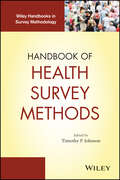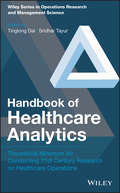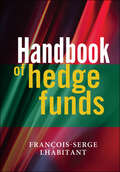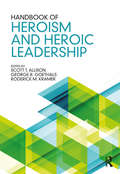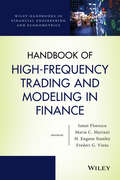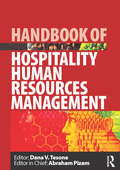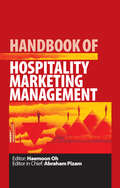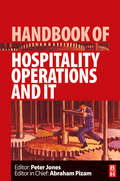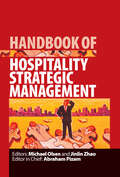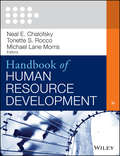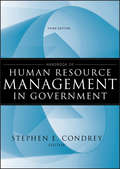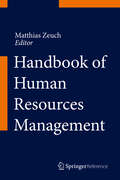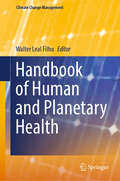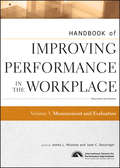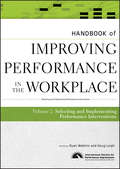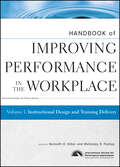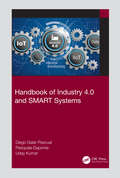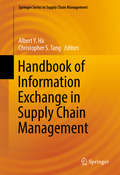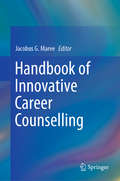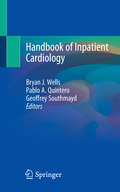- Table View
- List View
Handbook of Health Survey Methods
by Timothy P. JohnsonA comprehensive guidebook to the current methodologies and practices used in health surveysA unique and self-contained resource, Handbook of Health Survey Methods presents techniques necessary for confronting challenges that are specific to health survey research. The handbook guides readers through the development of sample designs, data collection procedures, and analytic methods for studies aimed at gathering health information on general and targeted populations.The book is organized into five well-defined sections: Design and Sampling Issues, Measurement Issues, Field Issues, Health Surveys of Special Populations, and Data Management and Analysis. Maintaining an easy-to-follow format, each chapter begins with an introduction, followed by an overview of the main concepts, theories, and applications associated with each topic. Finally, each chapter provides connections to relevant online resources for additional study and reference. The Handbook of Health Survey Methods features:29 methodological chapters written by highly qualified experts in academia, research, and industryA treatment of the best statistical practices and specific methodologies for collecting data from special populations such as sexual minorities, persons with disabilities, patients, and practitionersDiscussions on issues specific to health research including developing physical health and mental health measures, collecting information on sensitive topics, sampling for clinical trials, collecting biospecimens, working with proxy respondents, and linking health data to administrative and other external data sourcesNumerous real-world examples from the latest research in the fields of public health, biomedicine, and health psychologyHandbook of Health Survey Methods is an ideal reference for academics, researchers, and practitioners who apply survey methods and analyze data in the fields of biomedicine, public health, epidemiology, and biostatistics. The handbook is also a useful supplement for upper-undergraduate and graduate-level courses on survey methodology.
Handbook of Healthcare Analytics: Theoretical Minimum for Conducting 21st Century Research on Healthcare Operations (Wiley Series in Operations Research and Management Science)
by Tinglong Dai Sridhar TayurHow can analytics scholars and healthcare professionals access the most exciting and important healthcare topics and tools for the 21st century? Editors Tinglong Dai and Sridhar Tayur, aided by a team of internationally acclaimed experts, have curated this timely volume to help newcomers and seasoned researchers alike to rapidly comprehend a diverse set of thrusts and tools in this rapidly growing cross-disciplinary field. The Handbook covers a wide range of macro-, meso- and micro-level thrusts—such as market design, competing interests, global health, precision medicine, residential care and concierge medicine, among others—and structures what has been a highly fragmented research area into a coherent scientific discipline. The handbook also provides an easy-to-comprehend introduction to five essential research tools—Markov decision process, game theory and information economics, queueing games, econometric methods, and data analytics—by illustrating their uses and applicability on examples from diverse healthcare settings, thus connecting tools with thrusts. The primary audience of the Handbook includes analytics scholars interested in healthcare and healthcare practitioners interested in analytics. This Handbook: - Instills analytics scholars with a way of thinking that incorporates behavioral, incentive, and policy considerations in various healthcare settings. This change in perspective—a shift in gaze away from narrow, local and one-off operational improvement efforts that do not replicate, scale or remain sustainable—can lead to new knowledge and innovative solutions that healthcare has been seeking so desperately. - Facilitates collaboration between healthcare experts and analytics scholar to frame and tackle their pressing concerns through appropriate modern mathematical tools designed for this very purpose. The handbook is designed to be accessible to the independent reader, and it may be used in a variety of settings, from a short lecture series on specific topics to a semester-long course.
Handbook of Healthcare Logistics: Bridging the Gap between Theory and Practice (International Series in Operations Research & Management Science #302)
by Maartje E. Zonderland Richard J. Boucherie Erwin W. Hans Nikky KortbeekThis book presents healthcare logistics solutions that have been successfully implemented at a variety of healthcare facilities. In each case, a major challenge is presented, along with the solution approach and implementation steps, followed by the impact on hospital operations. Problems encountered when implementing the results in practice are also discussed.Much of the work presented is drawn from the experiences of members of the Center for Healthcare Operations Improvement and Research (CHOIR) at Twente, along with the CHOIR spin-off company, Rhythm.
Handbook of Healthcare Operations Management
by Brian T. DentonFrom the Preface: Collectively, the chapters in this book address application domains including inpatient and outpatient services, public health networks, supply chain management, and resource constrained settings in developing countries. Many of the chapters provide specific examples or case studies illustrating the applications of operations research methods across the globe, including Africa, Australia, Belgium, Canada, the United Kingdom, and the United States. Chapters 1-4 review operations research methods that are most commonly applied to health care operations management including: queuing, simulation, and mathematical programming. Chapters 5-7 address challenges related to inpatient services in hospitals such as surgery, intensive care units, and hospital wards. Chapters 8-10 cover outpatient services, the fastest growing part of many health systems, and describe operations research models for primary and specialty care services, and how to plan for patient no-shows. Chapters 12 - 16 cover topics related to the broader integration of health services in the context of public health, including optimizing the location of emergency vehicles, planning for mass vaccination events, and the coordination among different parts of a health system. Chapters 17-18 address supply chain management within hospitals, with a focus on pharmaceutical supply management, and the challenges of managing inventory for nursing units. Finally, Chapters 19-20 provide examples of important and emerging research in the realm of humanitarian logistics.
Handbook of Healthcare System Scheduling
by Randolph HallThis edited volume captures and communicates the best thinking on how to improve healthcare by improving the delivery of services -- providing care when and where it is needed most -- through application of state-of-the-art scheduling systems. Over 12 chapters, the authors cover aspects of setting appointments, allocating healthcare resources, and planning to ensure that capacity matches needs for care. A central theme of the book is increasing healthcare efficiency so that both the cost of care is reduced and more patients have access to care. This can be accomplished through reduction of idle time, lessening the time needed to provide services and matching resources to the needs where they can have the greatest possible impact on health. Within their chapters, authors address: (1) Use of scheduling to improve healthcare efficiency. (2) Objectives, constraints and mathematical formulations. (3) Key methods and techniques for creating schedules. (4) Recent developments that improve the available problem solving methods. (5) Actual applications, demonstrating how the methods can be used. (6) Future directions in which the field of research is heading. Collectively, the chapters provide a comprehensive state-of-the-art review of models and methods for scheduling the delivery of patient care for all parts of the healthcare system. Chapter topics include setting appointments for ambulatory care and outpatient procedures, surgical scheduling, nurse scheduling, bed management and allocation, medical supply logistics and routing and scheduling for home healthcare.
Handbook of Hedge Funds
by François-Serge LhabitantA comprehensive guide to the burgeoning hedge fund industryIntended as a comprehensive reference for investors and fund and portfolio managers, Handbook of Hedge Funds combines new material with updated information from Francois-Serge L'habitant's two other successful hedge fund books. This book features up-to-date regulatory and historical information, new case studies and trade examples, detailed analyses of investment strategies, discussions of hedge fund indices and databases, and tips on portfolio construction.Francois-Serge L'habitant (Geneva, Switzerland) is the Head of Investment Research at Kedge Capital. He is Professor of Finance at the University of Lausanne and at EDHEC Business School, as well as the author of five books, including Hedge Funds: Quantitative Insights (0-470-85667-X) and Hedge Funds: Myths & Limits (0-470-84477-9), both from Wiley.
Handbook of Heroism and Heroic Leadership
by Roderick M. Kramer George R. Goethals Scott T. AllisonOver the past decade, research and theory on heroism and heroic leadership has greatly expanded, providing new insights on heroic behavior. The Handbook of Heroism and Heroic Leadership brings together new scholarship in this burgeoning field to build an important foundation for further multidisciplinary developments. In its three parts, "Origins of Heroism," "Types of Heroism," and "Processes of Heroism," distinguished social scientists and researchers explore topics such as morality, resilience, courage, empathy, meaning, altruism, spirituality, and transformation. This handbook provides a much-needed consolidation and synthesis for heroism and heroic leadership scholars and graduate students.
Handbook of High-Frequency Trading and Modeling in Finance (Wiley Handbooks in Financial Engineering and Econometrics #9)
by Ionut FlorescuReflecting the fast pace and ever-evolving nature of the financial industry, the Handbook of High-Frequency Trading and Modeling in Finance details how high-frequency analysis presents new systematic approaches to implementing quantitative activities with high-frequency financial data. Introducing new and established mathematical foundations necessary to analyze realistic market models and scenarios, the handbook begins with a presentation of the dynamics and complexity of futures and derivatives markets as well as a portfolio optimization problem using quantum computers. Subsequently, the handbook addresses estimating complex model parameters using high-frequency data. Finally, the handbook focuses on the links between models used in financial markets and models used in other research areas such as geophysics, fossil records, and earthquake studies. The Handbook of High-Frequency Trading and Modeling in Finance also features: • Contributions by well-known experts within the academic, industrial, and regulatory fields • A well-structured outline on the various data analysis methodologies used to identify new trading opportunities • Newly emerging quantitative tools that address growing concerns relating to high-frequency data such as stochastic volatility and volatility tracking; stochastic jump processes for limit-order books and broader market indicators; and options markets • Practical applications using real-world data to help readers better understand the presented material The Handbook of High-Frequency Trading and Modeling in Finance is an excellent reference for professionals in the fields of business, applied statistics, econometrics, and financial engineering. The handbook is also a good supplement for graduate and MBA-level courses on quantitative finance, volatility, and financial econometrics. Ionut Florescu, PhD, is Research Associate Professor in Financial Engineering and Director of the Hanlon Financial Systems Laboratory at Stevens Institute of Technology. His research interests include stochastic volatility, stochastic partial differential equations, Monte Carlo Methods, and numerical methods for stochastic processes. Dr. Florescu is the author of Probability and Stochastic Processes, the coauthor of Handbook of Probability, and the coeditor of Handbook of Modeling High-Frequency Data in Finance, all published by Wiley. Maria C. Mariani, PhD, is Shigeko K. Chan Distinguished Professor in Mathematical Sciences and Chair of the Department of Mathematical Sciences at The University of Texas at El Paso. Her research interests include mathematical finance, applied mathematics, geophysics, nonlinear and stochastic partial differential equations and numerical methods. Dr. Mariani is the coeditor of Handbook of Modeling High-Frequency Data in Finance, also published by Wiley. H. Eugene Stanley, PhD, is William Fairfield Warren Distinguished Professor at Boston University. Stanley is one of the key founders of the new interdisciplinary field of econophysics, and has an ISI Hirsch index H=128 based on more than 1200 papers. In 2004 he was elected to the National Academy of Sciences. Frederi G. Viens, PhD, is Professor of Statistics and Mathematics and Director of the Computational Finance Program at Purdue University. He holds more than two dozen local, regional, and national awards and he travels extensively on a world-wide basis to deliver lectures on his research interests, which range from quantitative finance to climate science and agricultural economics. A Fellow of the Institute of Mathematics Statistics, Dr. Viens is the coeditor of Handbook of Modeling High-Frequency Data in Finance, also published by Wiley.
Handbook of Hospitality Human Resources Management (Handbooks Of Hospitality Management Ser.)
by Dana V. TesoneHandbook of Hospitality Human Resources Management is an authoritative resource comprising an edited collection of papers, which review and discuss this crucial aspect of hospitality, whilst illustrating how theories and concepts can be applied to the hospitality industry. Written by internationally recognized practitioners and academics, this book provides thorough reviews and discussions.The depth and coverage of each topic is unprecedented. A must-read for hospitality researchers and educators, students and industry practitioners.
Handbook of Hospitality Marketing Management (Handbooks Of Hospitality Management Ser.)
by Abraham Pizam Haemoon OhThis handbook consists of 19 chapters that critically review mainstream hospitality marketing research topics and set directions for future research efforts. Internationally recognized leading researchers provide thorough reviews and discussions, reviewing hospitality marketing research by topic, as well as illustrating how theories and concepts can be applied in the hospitality industry.The depth and coverage of each topic is unprecedented. A must-read for hospitality researchers and educators, students and industry practitioners.
Handbook of Hospitality Operations and IT (Handbooks Of Hospitality Management Ser.)
by Peter JonesHandbook of Hospitality Operations and IT provides an authoritative resource forcritical reviews of research into both operations and IT management. Internationallyrenowned scholars provide in-depth essays and explanations of case studies, to illustratehow practices and concepts can be applied to the hospitality industry.The depth and coverage of each topic is unprecedented. A must-read for hospitality researchers and educators, students and industry practitioners.
Handbook of Hospitality Strategic Management (Handbooks Of Hospitality Management Ser.)
by Michael Olsen and Jinlin ZhaoHandbook of Hospitality Strategic Management provides a critical review of mainstream hospitality strategic management research topics. Internationally recognized leading researchers provide thorough reviews and discussions, reviewing strategic management research by topic, as well as illustrating how theories and concepts can be applied in the hospitality industry. This book covers all aspects of strategic management in hospitality.The depth and coverage of each topic is unprecedented. A must-read for hospitality researchers and educators, students and industry practitioners.
Handbook of Human Factors and Ergonomics in Contemporary Business: Strategic Orientation, Corporate Success and Innovation
by Monika Srivastava Arshi Naim Shad Ahmad Khan Sumit NarulaHandbook of Human Factors and Ergonomics in Contemporary Business highlights the symbiotic relationship between human-centric approaches and organizational success in 21st century business and corporate culture. It delivers a comprehensive exploration of how integrating human factors and ergonomics strategically can fuel innovation, enhance performance, and deliver a competitive advantage.By promoting employee wellbeing to implementing ergonomic interventions for heightened productivity, the chapters offer invaluable insights into the role of human factors across differing business sectors. Edited and authored by distinguished experts in the field, this handbook presents theoretical frameworks, empirical evidence, and real-world case studies. Across these chapters split into various sections on perspectives, digitalization and wellbeing, it provides interdisciplinary perspectives and practical applications to equip readers with the tools needed to encourage thriving workplace environments, nurture employee welfare, and foster innovation and creativity. International case studies from diverse businesses and topics on Industry 5.0, logistics, strategy, UX, productivity, green issues and much more result in a thorough overview of the topic. It will help any reader optimize organizational performance and understand the key connections between human factors and business success.This title is an essential read for researchers and professionals in ergonomics and human factors, business and management, leadership, engineering design and human resources.
Handbook of Human Factors and Ergonomics in Health Care and Patient Safety (Human Factors and Ergonomics)
by Pascale CarayonThe first edition of Handbook of Human Factors and Ergonomics in Health Care and Patient Safety took the medical and ergonomics communities by storm with in-depth coverage of human factors and ergonomics research, concepts, theories, models, methods, and interventions and how they can be applied in health care. Other books focus on particular human
Handbook of Human Resource Development
by Neal F. ChalofskyHuman Resource Development Relies Upon a Strong Educational Foundation In the Handbook of Human Resource Development, Neal Chalofsky, Tonette Rocco, and Michael Lane Morris have compiled a collection of chapters sponsored by the Academy of Human Resource Development to address the fundamental concepts and issues that HR professionals face daily. The chapters are written and supported by professionals who offer a wide range of experience and who represent the industry from varying international and demographic perspectives. Topics addressed form a comprehensive view of the HRD field and answer a number of key questions. Nationally and internationally, how does HRD stand with regard to academic study and research? What is its place in the professional world? What are the philosophies, values, and critical perspectives driving HRD forward? What theories, research initiatives, and other ideas are required to understand HRD and function successfully within this field? As the industry grows, what are the challenges and important issues that professionals expect to face? What hot topics are occupying these professionals now? The Handbook’s insight and guidelines allows students and HR professionals to build a fundamental understanding of HRD as an industry, as a field of research, and for future professional success.
Handbook of Human Resource Management in Government
by Stephen E. CondreyThe practice of public human resource management has evolved significantly in recent years due toincreased outsourcing, privatization, and the diminution of public employee rights. This thoroughly revised and updated edition of the classic reference Handbook of Human Resource Management in Government offers authoritative, state-of-the-art information for public administrators and human resource professionals. The third edition features contributions from noted experts in the field, including Donald E. Klingner, Mary E. Guy, Jonathan P. West, Jeffrey L. Brudney, Montgomery Van Wart, J. J. Steven Ott, Norma M. Riccucci, and many more.Praise for the Handbook of Human Resource Management in Government"This third edition of the Handbook of Human Resource Management in Government is an essential resource for scholars, practitioners, and general readers in need of concise summaries of up-to-date, cutting-edge, public personnel administration research. No other handbook on the market more concisely, more comprehensively, more clearly synthesizes this vast, rapidly changing field that remains so vital to effective government performance." -Richard Stillman, editor-in-chief, Public Administration Review"The Handbook of Human Resource Management in Government comprehensively and seamlessly blends theory and practice. The result is a clear road map that can finally make HR a key player in helping thegovernment meet the unprecedented challenges facing our nation, our states, and our communities." -Bob Lavigna, vice president, Research, Partnership for Public Service, Washington, DC"With each successive edition, Condrey's Handbook of Human Resource Management in Governmentbecomes a more essential tool for graduate students who wish to improve their understanding of this field. Condrey's own expertise has enabled him to take contributions from leading experts in the field and shape them into a reader that is comprehensive, engaging, and authoritative."-Donald E. Klingner, University of Colorado Distinguished Professor, School of Public Affairs, University of Colorado at Colorado Springs; former president, American Society for Public Administration; and fellow, National Academy of Public Administration"For anyone concerned with HRM in government, this updated and expanded volume is 'must reading.'"-Meredith Newman, president, American Society for Public Administration
Handbook of Human Resources Management
by Matthias ZeuchHuman resources topics are gaining more and more strategic importance in modern business management. Only those companies that find the right answers to the following questions have a sustainable basis for their future success: - How can we attract and select the right talent for our teams? - How can we develop the skills and behaviors which are key for our business? - How can we engage and retain the talent we need for our future? While most other management disciplines have their standards and procedures, Human Resources still lacks a broadly accepted basis for its work. Both the structured collection of reflected real-life experience and the multi-perspective view support readers in making informed and well-balanced decisions. With this handbook, Springer provides a landmark reference work on today's HR management, based on the combined experience of more than 85 globally selected HR leaders and HR experts. Rather than theoretical discussions about definitions, the handbook focuses on sharing practical experience and lessons learned from the most relevant business perspectives: - cultural / emotional perspective - economic perspective - risk perspective - operational perspective.
Handbook of Human and Planetary Health (Climate Change Management)
by Walter Leal FilhoThis book contains a set of papers which explore the subject matter of human and planetary health at various angles The year 2015 was a special year in the field of human and planetary health. In that year, the report, produced by the Rockefeller Foundation and the journal The Lancet, called “Safeguarding human health in the Anthropocene epoch: report of The Rockefeller Foundation-Lancet Commission on planetary health” was launched. Also in 2015, the World Health Organization and the Secretariat of the Convention on Biological Diversity published the report “Connecting global priorities: biodiversity and human health: a state of knowledge review” with over 100 contributors, meant to guide future joint actions. Both documents comprehensively address the need for a better understanding of the connections between human health and ecosystems and the risks associated with damages to the integrity of the planet. The period in which humanity finds itself right now, the Anthropocene, is a risk one since mankind is putting the planet under considerable pressure. These elements have led to the emergence of a new field of research, namely planetary health. Planetary health seeks to address a very concrete and urgent contemporary problem, namely the need to understand, quantify, and act in order to reverse the effects of human population growth and the acceleration of socioeconomic activities on the environment and, inter alia, the disturbances in the Earth's natural ecosystems and how these, in turn, impact human health and well-being. Anthropic disturbances in natural ecosystems are characterized by changes in climate, land use, changes in the nitrogen and phosphorus cycle, chemical pollution of soil, water and air, reduction in the availability of drinking water, loss of biodiversity, destruction of the ozone layer, and ocean acidification, among others. In all these areas, there is a perceived need to document and promote examples of initiatives and good practice, which may change current trends. This book addresses this need. It documents experiences, case studies, and projects which explore the connections between human and planetary health and illustrates examples which show the consequences of ecosystemic disturbances to the health and well-being of humanity, with the emergence of new diseases, worsening of infectious diseases and increase in chronic non-communicable diseases related to the deterioration of the current food system, hyper-urbanization, microbial resistance, climate-led migration and zoonoses, among others. Planetary health is a new effort to deal with the question of sustainability and human life on the planet under an increasingly integrative, transdisciplinary, and global perspective, since the problems of this planetary crisis cross geopolitical borders and academic boundaries and affect humanity as a whole. This book provides a contribution to this emerging field. Thanks to its design and the contributions by experts from various areas, it provides a welcome contribution to the literature on planetary health, and it inspires further works in this field.
Handbook of Improving Performance in the Workplace, Measurement and Evaluation
by James L. Moseley Joan C. DessingerThis cross-disciplinary, international Handbook brings together best-in-field research and practice to provide an up-to-date summary of the leading ideas in performance measurement, theory, and practice. This invaluable reference provides a comprehensive review of all information presently available about Measuring and Evaluating Learning and Performance, Designing Evaluation, Qualitative Performance Measurements, Quantitative Performance Measurements, Formative Evaluation, Summative Performance Measurements, Confirmative Performance Measurements, Surveys and Questionnaires, Focus Groups and Interviews, Observation Methods, Sampling, Evidenced-based Performance Measurements, Analyzing Data, Planning Performance Measurement and Evaluation, Strategies for Implementation, and cases from Around the World.
Handbook of Improving Performance in the Workplace, The Handbook of Selecting and Implementing Performance Interventions
by Ryan Watkins Doug LeighThere is a need for a standard reference for instructional design professionals. Sponsored by ISPI, Volume One of the Handbook of Training and Improving Performance presents multi-disciplinary knowledge, standard principles, and evidence-based best practices for designing instruction delivering training. It offers a comprehensive review of topics such as: Interventions at the Worker Level; Interventions at the Work Team Level; Interventions at the Workplace and Organizational Level; Implementation Interventions; Project Management; Measuring the Success of Implementation; Managing Implementation. The book features international cases.
Handbook of Improving Performance in the Workplace, Volume 1: Instructional Design and Training Delivery
by Wellesley R. Foshay Kenneth H. SilberThere is a need for a standard reference for instructional design professionals. Sponsored by ISPI, Volume One of the Handbook of Training and Improving Performance presents multi-disciplinary knowledge, standard principles, and evidence-based best practices for designing instruction delivering training. It offers a comprehensive review of topics including: Performance Analysis and Needs Assessment; Establishing Performance Objectives and Performance Measurements; Designing Instruction for Results; Developing Instruction for Results; Implementation, Delivery, and Facilitation of Instructional Design; Evaluating Instructional Design; Managing the Instructional Design Process; Instructional Design Competencies; and includes international case studies.
Handbook of Industry 4.0 and SMART Systems
by Uday Kumar Diego Galar Pascual Pasquale DaponteIndustry 4.0 refers to fourth generation of industrial activity characterized by smart systems and internet-based solutions. This book describes the fourth revolution based on instrumented, interconnected and intelligent assets. The different book chapters provide a perspective on technologies and methodologies developed and deployed leading to this concept. With an aim to increase performance, productivity and flexibility, major application area of maintenance through smart system has been discussed in detail. Applicability of 4.0 in transportation, energy and infrastructure is explored, with effects on technology, organisation and operations from a systems perspective.
Handbook of Information Exchange in Supply Chain Management
by Albert Y. Ha Christopher S. TangSharing accurate and timely supply and demand information throughout a supply chain can yield significant performance improvements to all members of the supply chain. Despite the benefits, many firms are reluctant to share information with their supply chain partners due to an unequal distribution of risks, costs, and benefits among the partners. Thus, incentive mechanisms must be in place to induce communication, cooperation, and collaboration among all members of a supply chain. The issue of Information exchange/sharing has been examined by various researchers over the last 15-20 years. However, there is no research book that compiles various approaches, analyses, key implications, as well as future development of this area. This book will serve as a handbook for researchers who are interested in learning the state of the art of the line of research in this area and explore open research topics in this area. Contributors, all leading researchers, have committed to delivering 18 chapters, broken into four distinct sections covering the Value of Information Sharing, Contracting and Information, Information Signaling, and Incentives for Information Sharing.
Handbook of Innovative Career Counselling
by Jacobus G. MareeThis book examines a topic widely regarded as the most pressing in career counselling today, i.e., how to ensure that everyone receives career counselling and that all workers have the opportunity to engage in sustainable, decent work. The author holds that career counselling should not only advance workers’ self- and career construction, helping them design successful career-lives and make social contributions, and live purposeful lives – it should also expound new theoretical approaches and interventions. Furthermore, the book criticizes global society for overlooking the basic needs of many workers, especially the most vulnerable and disadvantaged. An important feature of the book is its emphasis on promoting a creative and innovative approach to career counselling so as to better answer contemporary career-related questions. It offers guidance on how to advance entrepreneurship and help workers develop critical thinking, curiosity, creativity, collaboration, and communication skills. In this way the book promotes innovation in career counselling and maps the way forward in a theoretical and practical manner that helps clients ‘flourish’ rather than merely ‘survive’ in turbulent times impacted by the fourth wave in psychology, career counselling, the economy, as well as the 4th industrial revolution (Work 4.0).
Handbook of Inpatient Cardiology
by Bryan J. Wells Pablo A. Quintero Geoffrey SouthmaydThis book serves as a pocket-sized resource to aid with the diagnosis and management of cardiovascular disease in the inpatient setting. Containing up-to-date information from guidelines and clinical trials, this book is the only handbook-style reference on cardiac care designed specifically for the hospitalist.The first section of the book covers cardiac pathology with an emphasis on evidence-based and guideline-based approaches to patient care. Each chapter focuses on a specific cardiovascular disease state such as acute coronary syndrome, atrial fibrillation, pulmonary hypertension, and aortic disease. The second section examines the differential diagnoses and recommended workup for common cardiac chief complaints including chest pain, palpitations, syncope, and dyspnea. The third and final section discusses indications and interpretation of commonly used cardiac procedures and imaging modalities. This book provides a concise review over a broad range of cardiovascular disease states in an accessible handbook-style to aid with the care of these patients. The Handbook of Inpatient Cardiology is an essential resource for physician hospitalists caring for cardiac patients on the medical ward in addition to cardiology physicians and trainees, affiliate providers, and students.
